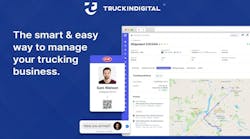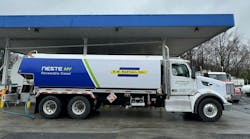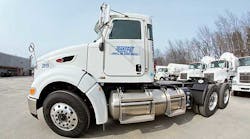Tank truck carriers made a very good showing at World LNG Fuels 2013 in Houston TX. In addition to buying liquefied natural gas-fueled trucks, tank fleets are hauling the fuel in bulk to the fueling locations that springing up in many parts of the United States.
During the January 21-23 conference organized by Zeus Development Corp, updates on natural gas fleet activity were offered by several tank fleet operators:
Heckmann Water Resources now has 104 LNG-fueled tractors hauling process water in the Haynesville (western Louisiana and East Texas) and Barnett (north central Texas) natural gas shale plays, according to Brett Quigley, Heckmann Corp director of operations. All of the tractors have the 15-liter Westport GX engine. The oilfield operator bought the first 50 of its LNG-fueled tractors in 2011.
Hoopes Transport, Ulysses PA, now uses 15 Peterbilt tractors with the LNG-fueled 15-liter Westport GX engine to haul frack water, oversized loads, box containers on chassis, and other cargoes in Pennsylvania and other parts of the Northeast. The fleet operator also bought several portable LNG fueling units and has four more on order.
Genox Transportation Inc, a LaPorte TX cryogenic gas carrier, now has five LNG transports serving LNG fueling locations in California. The tractors were specified with the 15-liter Cummins Westport GX engine. The MC338 cryogenic trailers have a 13,000-gallon capacity and were built by Alloy Custom Products Inc.
Eagle Transport Corp, a Rocky Mount NC petroleum hauler, is taking its first steps into LNG transportation with the purchase of four LNG cryogenic trailers. The carrier also plans to purchase natural gas-fueled tractors for the new LNG distribution business.
Looking back on what has happened with natural gas as a vehicle fuel over the past several years, John W Somerhalder II, chairman, president, and chief executive officer of AGL Resources, said “It’s amazing how far we have come, and we are seeing tremendous interest in natural gas as a vehicle fuel. Look at all of the obstacles that have fallen away. I am optimistic about the future, and I believe the natural gas-fueled vehicle market will be at the higher range of current estimates.
He added that facilities and infrastructure are now in place to enable the market to grow, and it is clear that progress is being made. For instance, 75% of the transit buses in Atlanta GA now run on natural gas.
Steve Kirchhoff, vice-president, Americas, for ExxonMobil Gas & Power Marketing, said his company’s goal is to help customers view abundant natural gas as an opportunity for new business rather than a loss of diesel sales. There is a critical need to educate everyone in the marketplace.
”Certainly, we have an abundant supply of natural gas in the US market, but we need to make sure people understand what that means,” he said. “We need to be sure the nation at large buys into the idea of natural gas as a vehicle fuel. We also need to level the playing field for natural gas as a vehicle fuel by addressing disparities in fuel tax rates between natural gas and refined fuels, such as gasoline and diesel.”
The environmental benefits of natural gas as a vehicle fuel often are overlooked, and that needs to change, according to Samuel F Thomas, chairman, president, and chief executive officer of Chart Industries. “Natural gas cuts air pollution (compared to refined fuels), and we need to promote that,” he said.
The environmental benefits have been a key factor in the aggressive shift to natural gas-fueled vehicles in China. “Over one million commercial vehicles a year are now being manufactured in China, and more than 60,000 of the trucks built in 2013 will run on natural gas,” Thomas said. “We believe the natural gas-fueled truck population in China could reach 40% in the next few years.”
Progress also is being made in the United States, but it is taking time. “Natural gas groups have accomplished a lot in changing perceptions of natural gas as a vehicle fuel,” he said. “Over a three-year period we’ve gone from natural gas being view as dirty to being embraced by a larger percentage of the American public. It takes time to put fueling infrastructure in place, but it is being done. We build a variety of LNG production and distribution equipment, and our business is growing by more than 3% a year.”
Thomas adds that the US commercial truck market should change significantly over the next three years. Buyers should see more natural gas engine variety, and engine production volumes should be up significantly. “We should begin seeing less of an upcharge for natural gas-fueled trucks,” he said. “I believe the upcharge should fall into the $10,000 range, which is where it is now in China. Return on investment will be enhanced.”
George Yates, chairman and chief executive officer of HEYCO Energy Group, said the industry needs to view every mobile engine as a market for LNG. “It’s a huge potential market,” he said. “I believe the US market for natural gas as a vehicle fuel will be greater than 3%. We have bountiful feedstocks, and natural gas is gaining momentum and interest from the public and transportation industry. From even the most conservative perspective, the United States has at least a 100-year supply of natural gas, and that is plenty to meet a broad market demand.”









